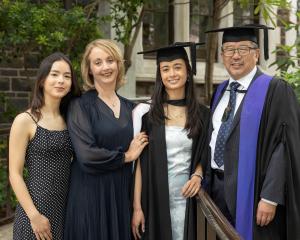
The year was 1861 and Otago was in the middle of a gold rush.
Dunedin was starting to see the economic benefits of the boom but poor infrastructure was creating challenges.
Exports of farm produce were on the rise but the harbour facilities were inadequate, wooden buildings in the business district made the city a fire threat, roading was poor and a rail system non-existent.

Four years later, Chinese miners were starting to move to the West Coast and the chamber had a special meeting to encourage immigration into Otago.
The Otago Southland Employers Association was born into a crisis, a history of that organisation said.
In 1890, maritime workers in New Zealand were striking in support of Australian wharfies’ attempts to form unions — the strikes were the first major industrial dispute in New Zealand.
The minutes from the association’s first meeting, held on September 3, 1890, showed the association wanted to recognise the rights of labour and see a peaceful solution.
A general meeting was then held on September 22 and a letter was sent from Southland employers indicating they did not want to be involved. Southland did not join the association for another 81 years.
Fast forward to 2020 and the two organisations voted to merge to create a new business support group. After a year of working through the merger, yesterday was the first official day of operation for Business South: Otago Chamber and Southern Employers or Business South for short.
John Christie, now director of Dunedin’s economic development agency Enterprise Dunedin, was chief executive of the Otago Chamber of Commerce for nearly 20 years.
He joined the chamber in 1993, straight out of university, and was appointed chief executive two years later, aged 26.
At the time, the chamber — which had just amalgamated with the Otago Southland Manufacturing Association and the Export Institute of Otago — was in a poor financial state, with declining membership, Mr Christie said.
He described it as a ‘‘pretty tough time’’, saying the chamber had to be rebuilt.
‘‘Financially, there was not much in the reserves and declining memberships didn’t make for a great situation.’’
Board members were personally calling local businesses to get them to become members to ensure the survival of the chamber, Mr Christie said.
‘‘It wasn’t an easy time at all.’’
One of his highlights was starting the Otago business awards.
‘‘I remember how much work went into it to ensure we really did run a significant event to celebrate businesses’ success. We put a lot of work into that and it paid off.’’
One of the chamber’s key objectives was to lobby and advocate on behalf of businesses.
In 2005, the Dunedin City Council launched a concept to redevelop the harbourside area.
As the plans took shape, the chamber became concerned that the desire to attract hospitality and accommodation businesses would compromise existing businesses.
Four years later, the chamber, along with four other businesses, lodged an application in the Environment Court to stop the development.
‘‘Looking back, it was a long and hard-fought battle and we invested heavily into that because we knew we needed to retain jobs for the city.’’
The council ending up withdrawing its plans.
The chamber was also involved in significant lobbying to stop the closure of Hillside Workshops, meeting MPs and holding a protest in the Octagon.
Big companies left Dunedin or closed during Mr Christie’s time.
‘‘You couldn’t do anything to stop them going and it seemed to be one after another.
‘‘It was hard to see where that would end and whether the economy would rise to the challenge and bounce back.’’
In 2014, Mr Christie was part of developing Dunedin’s economic development strategy and Enterprise Dunedin was established.
Leaving the chamber to move to Enterprise Dunedin was ‘‘tremendously hard’’.
‘‘I loved the role, it was a big part of my life,’’ Mr Christie said.

Otago Southland Employers Association life member Philip Broughton spent six years as president of the organisation, stepping down 10 years ago.
Mr Broughton spent nearly 40 years at local accountancy firm Polson Higgs and has sat on several boards.
During Mr Broughton’s time as president,there was an attempt to merge the two organisations but ‘‘it never really got off the ground’’.
Several meetings were held to discuss the possible merger to create a ‘‘one united voice’’.
‘‘We came across barriers, for example different fee structures. It was going to be a jigsaw puzzle and we never got to putting the pieces together.’’
The employers association was part of the Business NZ network and the four presidents from each of the New Zealand employers associations made up the board of the network.
While Mr Broughton was president, he was also elected president of Business NZ for a two-year term in 2010.
‘‘It was interesting having an iwi boy from Dunedin as the president of Business NZ,’’ he said, laughing.
Mr Broughton said being president of the network was ‘‘like sitting at the top table’’.
‘‘That was a great experience, I really enjoyed doing that.’’
One of the challenges of the association had at the time was the geographical spread and making sure it reached everyone.
‘‘There was a lot of work to be done across the whole region, Central Otago, South Otago and good old Dunedin, so we needed to ensure we got that spread right,’’ Mr Broughton said.
He was pleased to see the organisations finally coming together.
‘‘I’m pleased to finally see that one united voice.’’













